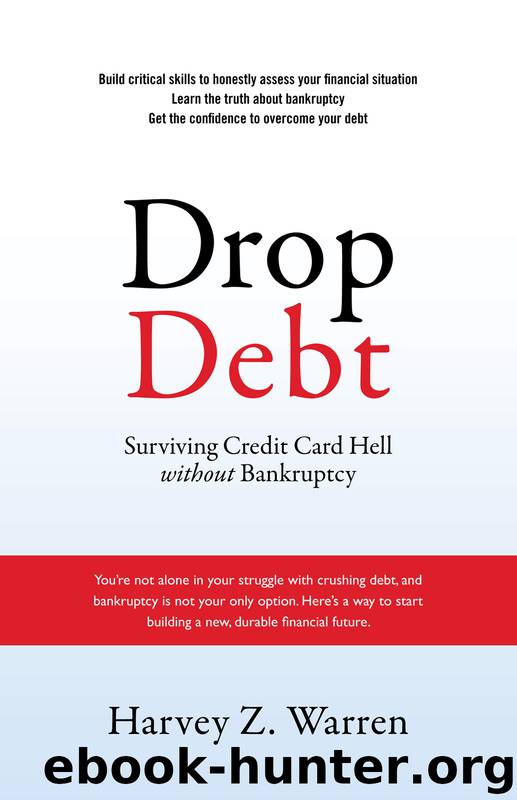Drop Debt by Harvey Warren

Author:Harvey Warren
Language: eng
Format: epub
Publisher: Greenleaf Book Group
Published: 2010-04-06T04:00:00+00:00
Re-Aging Accounts: Blessing or Curse?
Do you remember that earlier I mentioned the fact that when consumers enroll with a CCCS provider, their accounts are “re-aged”? I have heard highly regarded and often-quoted consumer advocates from leading Washington, D.C.–based consumer advocacy groups repeatedly talk about the benefits of re-aging. Creditors allow consumers who are working with CCCS providers and who have affirmed their entire debt without balance reductions to have the “perk” of removing the late reporting from their credit reports—re-aging the account. Why does that matter? The credit-granting industry has a unified reporting system that gives values—or, in this case, negative values—to consumer performance. Obviously, 30-day, 60-day, and 90-day late reporting and charge-offs have increasingly negative effects on your credit rating. So getting those off your record is good, right?
I very controversially say, “Not necessarily.” Remember, we are discussing the excessive use of credit as a disease. Creditors stop extending credit to you when those 30-, 60-, and 90-day late payments show up on your credit report. At the exact moment that you should be cutting up your credit cards, your enrollment in a CCCS program re-ages your account and improves your credit report, which encourages creditors to give you more credit. The precise thing that you don’t need—an improved credit rating affording you more access to credit—is the first and most immediate benefit of re-aging.
I learned about this problem from the good folks at Carfax. They were routinely hearing about individuals buying cars based on excellent credit ratings. The credit score reporting was all they needed to make a loan. Because of re-aging, without looking at the full credit report, they were unable to determine whether or not the borrower was in credit card trouble. The CCCS perk of re-aging had masked the problem. Some consumers were unable to curb their credit appetite, and the natural corrective device of having a diminished credit rating was defeated by the “benefit” of re-aging. In my opinion, re-aging is detrimental to the consumers’ financial future, although it seems to benefit them in their moment of crisis. It only enables continued misuse of credit, and therefore, it delays true recovery.
So is CCCS your way out of credit card hell? Let’s examine some of the major pros and cons more closely.
Pro:
CCCS agencies are bank endorsed: The creditors who issued your cards support these programs.
Remember that CCCS is not what it used to be. And be wary of what the Consumer Federation of America calls “debt mills”—unscrupulous agencies more interested in charging fees than working on a good debt plan for you. If the CCCS provider you select is licensed, bonded, insured, and certified (by the NFCC or AICCCA), you can be reasonably certain you are safe from possible fraud.
Con:
CCCS agencies are bank endorsed: In essence, this is the bank “helping” you.
CCCS agencies are not consumer-oriented, even though “consumer” is in the title of the organization. But going with a CCCS provider may damage your creditworthiness. As indicated by giant lender GMAC’s “RFC Guidelines for
Download
This site does not store any files on its server. We only index and link to content provided by other sites. Please contact the content providers to delete copyright contents if any and email us, we'll remove relevant links or contents immediately.
The Compound Effect by Darren Hardy(8968)
Tools of Titans by Timothy Ferriss(8396)
Nudge - Improving Decisions about Health, Wealth, and Happiness by Thaler Sunstein(7707)
Win Bigly by Scott Adams(7198)
Deep Work by Cal Newport(7083)
Rich Dad Poor Dad by Robert T. Kiyosaki(6632)
Principles: Life and Work by Ray Dalio(6449)
Pioneering Portfolio Management by David F. Swensen(6301)
Digital Minimalism by Cal Newport;(5765)
The Barefoot Investor by Scott Pape(5745)
Grit by Angela Duckworth(5615)
The Slight Edge by Jeff Olson(5417)
Discipline Equals Freedom by Jocko Willink(5390)
The Motivation Myth by Jeff Haden(5212)
You Are a Badass at Making Money by Jen Sincero(4930)
The Four Tendencies by Gretchen Rubin(4603)
Eat That Frog! by Brian Tracy(4540)
The Confidence Code by Katty Kay(4260)
Bullshit Jobs by David Graeber(4190)
